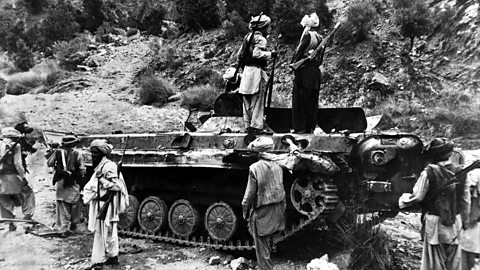The Soviet invasion of Afghanistan, 1979
In addition to the development of new nuclear missiles, the Cold War escalated further when the USSR invaded Afghanistan.
Why did the USSR invade Afghanistan?
Afghanistan bordered some of the southern Soviet republics of the USSRUnion of Soviet Socialist Republics - collection of states, also known as the Soviet Union., making it easy for Moscow to support a communismA classless society where all property is owned publicly.-led government led by Taraki when it seized power in Kabul in April 1978.
Many ordinary Afghans rejected the new communist government because its atheism was at odds with their Muslim faith. The communists imprisoned, tortured and murdered many Muslim religious leaders. This led to the formation of an anti-communist resistance movement known as the MujahideenA militant Islamic group who fought against the Soviet invasion of Afghanistan..
In September 1979 the Afghan politician, Amin, arranged for the murder of the communist Prime Minister, Taraki, and Amin seized control. Amin entered into discussions with the US.
This alarmed the USSR who didnāt want American influence on their Southern border. On 24 December 1979, Soviet troops invaded Afghanistan. Amin was assassinated and a pro-Moscow leader, Babrak Karmal, was installed in his place.
Challenges faced by the Soviet Army in Afghanistan
- The Soviet Red ArmyArmy of the USSR. was ill-prepared for the desert and mountain landscapes of Afghanistan.
- The Mujahideen had expert local knowledge and used the deserts and mountainous terrain to their advantage.
- The Mujahideen were extremely motivated as they were fighting for their homeland and their religion against a foreign invader.

The American Response
- Seeing the situation in Afghanistan as an extension of the Cold War, the US supported the Mujahideen against their old enemy, the USSR, and refused to sign SALT IIThe second of the Strategic Arms Limitation Talks. Although it was signed by US President Jimmy Carter and Soviet Union leader Leonid Brezhnev in 1979, it was not ratified by the US Senate following the Soviet invasion of Afghanistan. .
- The Carter Doctrine: Believing that the Soviet invasion of Afghanistan might lead to threats to US interests in the Persian GulfArea of sea to between Saudi Arabia and Iran. In 1979, America was concerned this would be under threat from the Soviet Union if its invasion of Afghanistan succeeded., in January 1980 the US President, Jimmy Carter, announced in his State of the Union AddressAnnual event where the President of America makes a speech to the people. that the US was extending its policy of containmentAn American policy to try and stop communism from spreading, to restrict it from spreading to other countries. to the Middle EastGeographical area between Asia, Europe and North Africa. Contains countries such as Israel, Saudi Arabia, Iran and Iraq.. The Carter Doctrine stated that the USA was prepared to use force to stop any country from gaining control over the oil rich states of the Middle East.
- Alongside this, Carter formed an alliance with China and Israel to support the Mujahideen rebels against the USSR, and the CIAA US organisation used to gather information on the countryās opponents and enemies. secretly provided the Mujahideen with weapons and funds. The USA also imposed economic sanctions on the Soviet Union and abolished most US-Soviet trade, which led to deterioration in diplomatic relations between the superpowerCountries who have huge influence or strength, giving them significant global power..
- In 1980 the USA boycottTo refuse to take part in, buy or use something in order to show disapproval or bring about a change. the Moscow Olympics in protest at the invasion of Afghanistan. The USSR would return the favour by boycotting the 1984 Olympic Games in Los Angeles!
Ending the War in Afghanistan
Afghanistan became the Soviet Unionās Vietnam: an expensive, embarrassing war with little hope of victory, where they were beaten by local guerrillaTactic used by a small group against a larger army, normally using hit and run tactics or surprise attacks. forces.
It dragged on until 1988 when the Soviet leader, who by then was Mikhail Gorbachev, signed a deal to end the war and the last Soviet troops left Afghanistan in February 1989.